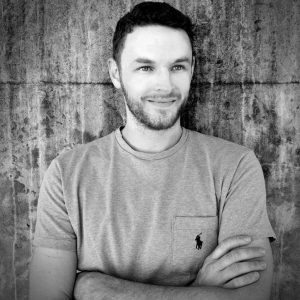
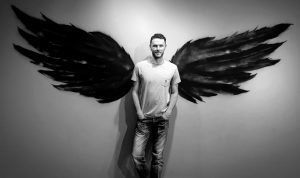
Hi, Scott! Welcome to Susan Finlay Writes blog site. Can you tell us a bit about your background? Where do you live? What kind of work do you do?
I’m 30 years old and was born and raised in the United States. I’ve been a software developer for about seven years, and I’m currently working in the automotive industry building car-sharing and other mobility products.
I was active in the hacker scene when I was younger, but not doing what the news tries to frighten people with. I was what is called a “white-hat hacker” or “ethical hacker” which is basically someone using their security knowledge to try to improve security in the world by finding vulnerabilities in software and informing the owners before someone malicious exploits them.
I met my wife online through common interest in hacking and programming and that led me to move to Germany where I currently live with my wife and daughter.
Your books are cross-genres—part science fiction and part mystery. What draws you to each?
My engineering background is probably what draws me to both. Why being a software developer gives me an interest in science fiction is probably self explanatory. I dream of the things that will one day come including robots, artificial intelligence , self-driving cars, holograms, etc. With my security background, however, I also immediately see the problems that could arise with such technological advancements.
Why being a software developer draws me to mystery might be less obvious. In many ways I see myself as a sort of detective. I spend much of my day examining logs and graphs, trying to see patterns and fluctuations in them. I use this “evidence” regularly for debugging and investigating disruptions. A good detective is a being of logic, as is a good developer.
Do you have favorite authors in your genres?
Some of my favorite authors in the genres are Isaac Asimov, Ray Bradbury, Stephen King, Raymond Chandler, Dashiell Hammett, Agatha Christie, and Sir Arthur Conan Doyle.
Your first novel, A Fatal Exception, was released in early July, 2019. Can you tell us about the story?
A Fatal Exception is a hardboiled detective story centered around a quirky robot who may be self-aware and nearly human, or perhaps he’s just the result of unusual programming and upbringing. Perhaps there’s no difference between the two. All that’s clear is that Seven Sinclair is a strange bird and a hard case, and when an investigation into a simple hack gets him framed for murder he has to try to solve the case and clear his name.
Sergeant Rizzo of the Chicago PD, one of the few uncorrupted cops left in a dirty town, was once the bane of every mobster in the metropolis, but he’s getting old, and since he always had an aversion to technology, he has trouble keeping up with the younger detectives. When he finally sees the chance to prove once and for all the he was right about those wretched robots all along, he’s ready to stop at nothing to catch the tin can.
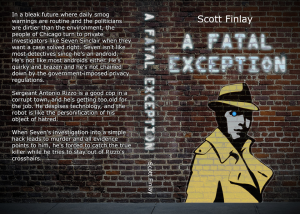
What inspired you to write it, and did you have to do a lot of research for it?
I started writing my other book, Epoch, which will come out later this month because of an idea my wife had and she thought it would make an interesting story. With some further encouragement from my wife, I started writing A Fatal Exception shortly after I finished the first draft of my other book, and it actually started with an idea for a totally different story, a young adult sci-fi. I had the idea for a quirky, sarcastic robot detective and then decided he belonged in his own story.
I was also inspired by other novels, for example The Maltese Falcon by Dashiell Hammett and Farewell My Lovely by Raymond Chandler. My protagonist, Seven, was heavily influenced by Sam Spade and Phillip Marlowe. My version of Chicago was influenced by Gotham City, from Batman, and another character, Rizzo, was partly influenced by Commissioner Gordon. And of course you can’t write a story about robots without being influenced by Isaac Asimov.
I was also inspired by current events and the current social and political situation in the world. Having lived in two continents gives me the ability to see a lot of things as an outsider, so I see a lot of problems in our society. I was inspired to write about the dystopian future which I hope we can avoid.
I didn’t need to do so much research for A Fatal Exception since a lot could be invented, one advantage of science fiction and fantasy, and I could draw a lot from my own knowledge. I did do some research on how to hack a prison’s locking mechanism and I tried to find blueprints for a Chicago police department. That, in combination with some of the bloody research I did for my other novel, probably puts me on a few NSA watchlists.
Are you planning a sequel? Do you see this as the beginning of a whole series?
I have plans to make a series out of it, but not a series that necessarily needs to be read sequentially but rather more Raymond Chandler or Agatha Christie style where each book follows the same protagonist but is a self-contained story. I already have a few ideas for sequels and an idea for a prequel.
I understand that your next novel, Epoch, is finished and ready to publish. When do you expect it to be available?
I’m just reading through the proof and making a final round of edits now. It should be ready by the end of the month.
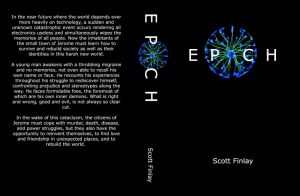
Both of your books are science fiction, and yet they are very different kinds of books in different sub-genres? Does one genre/sub-genre feel more natural to you, and why?
Epoch is technically science fiction, but not really. I think the term “speculative fiction” fits better. Epoch is a post-apocalyptic novel with a strong emphasis on philosophy whereas A Fatal Exception is a hardboiled mystery and hard science fiction. I definitely found A Fatal Exception much easier to write. I’m not sure if it had to do with the genre or more the writing style, which is completely different.
Who designed your book cover? Can you tell us about the design process? What inspired the design?
My wife designed the cover and created image herself since she’s pretty artistic. It started with an idea to put a silhouette of the protagonist on the cover, so we found an old photo of Humphrey Bogart in a hat and trench coat and my wife turned it into a drawing. We decided we wanted it to look urban, but we wanted to show the less glorious side of city life, so we went with the idea of graffiti. The graffiti idea was also inspired partly by the street artist, Banksy, who is also well known for conveying social criticism in his art. To give it a sort of futuristic look still, we used a technical font.
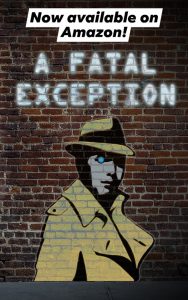
You work in a high-tech profession. Do your tech skills and knowledge help you in your writing and do they influence the types of stories you write?
I found that writing a book isn’t that different from writing code. You start by gathering product requirements, or building a premise. Then you start with architectural design, or creating an outline. After that comes implementation, or writing the actual story. Sometimes things didn’t turn out so cleanly so you need to do some refactoring, or revising. Having an editor take a look at it is basically the same as a peer review. It’s kind of the same thing just with different terminology.
My technical background also influenced the tools I use to write. For example, I keep my books in git repositories, a type of version control software. That way I have my work backed up along with a history of every change I made in the cloud. I also wrote about 50% of A Fatal Exception with my phone, and did 100% of the planning with it using tools like Evernote.
I was able to draw a lot from my experience as a developer while writing A Fatal Exception, not only regarding purely technical topics but also cultural (regarding office culture and developer culture).
Your mother is also a writer, with eleven published mystery novels. How does it feel to share the writing and publishing experience with her? Do you worry about being compared to each other?
I’m very proud of my mom for all the great novels she’s written and published. It’s pretty helpful too to have someone with experience to consult to know how things work and to be able to ask what’s normal.
I don’t really expect to be compared much since our writing styles and subject matter are so drastically different. I’m not sure if we really have the same target audience either. If someone would be interested in both and want to compare them I would hope he has just positive things to say about both.
For fun, if you could meet any book character, who would it be, and what would you do with them?
It’s a tough question, but if I had to pick I guess I’d go with Sherlock Holmes. I think it would be pretty interesting to accompany him on a case and observe firsthand how he does his thing.
- https://www.facebook.com/ScottFinlayAuthor/
- https://www.goodreads.com/author/show/19319151.Scott_Finlay
- https://www.scottfinlayauthor.com/
